- Home
- Diana Lopez
Ask My Mood Ring How I Feel
Ask My Mood Ring How I Feel Read online
Begin Reading
Table of Contents
A Sneak Peek of Confetti Girl
Copyright Page
In accordance with the U.S. Copyright Act of 1976, the scanning, uploading, and electronic sharing of any part of this book without the permission of the publisher constitutes unlawful piracy and theft of the author’s intellectual property. If you would like to use material from the book (other than for review purposes), prior written permission must be obtained by contacting the publisher at [email protected]. Thank you for your support of the author’s rights.
To Amabel, Marina, and Soli
9 BIKINIS
I spent the entire month of May waiting for summer—for waking up when I felt like it and not when the alarm told me to, for wearing cool skirts and no shoes, for spending time with my friends at the park and pool, and for our family vacation—this year a trip to Carlsbad Caverns, a giant cave system in New Mexico—and on to Roswell, where aliens once crash-landed. Of course, I knew aliens were a hoax, but I looked forward to Roswell anyway, if only to see how many people could be fooled by such a silly story. So when Mom said she was going to shop for bathing suits, I didn’t think twice. Sure, New Mexico was a desert, but every vacation spot had pools—not to mention the Texas coast, which we visited two or three times a year. And when she brought home nine bikinis, I thought it was odd, but only for a second, because Mom did funny things sometimes, like making potato chip pancakes or talking in a computer voice inspired by Star Trek shows.
“Come look, Chia,” Mom said, waving me into her room. “You too, Carmen.”
I stepped in, my nerdy little sister following.
“What do you think?” Mom asked, arranging the bikinis on the bed with the care of someone setting the table for Thanksgiving dinner. Their colors were bright like piñatas. One bikini top was striped, another polka-dotted, a third checkered. One had tropical flowers, and another, little palm trees.
“They’re very pretty,” I answered.
“Yeah. Real pretty,” Carmen said. “Are these for vacation?”
Mom shrugged. “You could say that. I bought one for each day of the week.”
Carmen’s finger pointed at each as she counted. Her math brain always counted things. “But there are nine bikinis here,” she said. “Does that mean we’re having a nine-day vacation?”
Once again, Mom said, “You could say that.”
Mom took the bikini bottoms and threw them into the small wicker basket she used as a trash can, then folded the tops and stacked them neatly in her lower dresser drawer.
“What are you doing?” I asked. I could totally understand potato chip pancakes, a computer voice, and buying nine bikinis, but throwing away something new was beyond me.
Before she could answer, my two-year-old brother walked in. “Gimme, gimme, gimme,” he said, grabbing a bikini top. When I tried to take it away, we got into a tug-of-war match.
“Let go, Jimmy!” I cried.
“It’s okay,” Mom said. “Let him have it. He’ll give it back after he’s had a good look.” She ran her fingers through his hair, but he was too interested in the bikini top to notice. Then she lifted him, hugged him tight, and said, “My baby, my beautiful baby,” even though he wasn’t a baby anymore. When Jimmy wriggled free, Mom grabbed Carmen and me for a group hug, and she said it again, “My babies, my beautiful babies.”
“Is everything okay?” Carmen asked.
“Of course. I’m just showing a little affection.”
“But you’re acting weird. Right, Chia?”
“Maybe,” I said.
“What do you mean by ‘maybe’? She is acting weird.”
Truth was, I did think Mom seemed a bit… off… but there were a lot of things I’d rather do than take Carmen’s side—like sleep on a block of ice or drink tomato sauce with crushed Oreos.
“It’s not weird,” I said. “Mom doesn’t need a special occasion to hug us or call us her babies.”
Mom said, “You’re so sweet,” and kissed the top of my head.
Carmen hated to be wrong, but more than that, she hated for me to be right. She glared at me. If her eyes were claws, I’d have a dozen scratch marks on my face.
“Okay, girls,” Mom said. “Why don’t you go to the other room? It’s time for Jimmy’s nap.”
“Gimme nap. Gimme nap,” Jimmy said, climbing onto the bed and grabbing a pillow. Carmen and I left him there and made our way to the kitchen.
A long time ago, Mom and Dad had bought us matching desks and placed them side by side in the den, but we preferred to hang out in the kitchen because it was huge and had a table as big as a stage. Besides, it usually smelled good in there—sometimes like Mom’s charro beans or beef stew, other times like biscuits or coffee—and when we were lucky like chocolate cake. Today, though, it didn’t smell like anything, but it would as soon as Mom started dinner.
Carmen and I sat on opposite ends, the rest of the table like a long hallway between us. Carmen made a skyscraper of library books about dream interpretation, Egyptology, and renewable energy. I had to roll my eyes. I mean, she wasn’t in college—yet. Besides, it was summer. Who spent the summer studying? Only my sister begged for a trip to the library each week. No thank you. I’d rather hang out with my friends or watch TV than read boring books.
Speaking of friends, I flipped open the laptop and spotted an e-mail from Iliana, with “Park?” in the subject line. “Hey, guys,” she wrote to me and a few other friends, “want to meet at the park tomorrow?” We all lived in the same neighborhood, and the park was a short walk from our homes. It had lots of shade, skateboarding ramps, swing sets, and a pool.
“Mom!” I called out. “Can I go to the park tomorrow?”
“Sure,” she called from the bedroom.
I hit the “reply” button and wrote, “I’ll be there.”
After checking the rest of my messages, I glanced at the shipping information for the Endless Band Mood Ring, the one Dad ordered for me after I said “please” a dozen times. Mom mentioned having one when she was a teen, and when I learned that mood rings change colors according to your emotions, I had to get one, too. My friends always wanted to know how I felt, and pointing to a mood ring seemed a lot easier than having a whole conversation about my feelings. It was scheduled to arrive tomorrow. Good. I needed to make sure I was here because the last thing I wanted was Carmen stealing my übercool ring, and she’d do it. No doubt in my mind she would.
“Did you know,” Carmen began, “that when Egyptians were turning dead bodies into mummies, they sucked the brains out through the nose?”
“I wonder if they used a sippy straw?” I said.
“And then they took out the intestines and put them in jars.”
“Imagine seeing that in a pantry—not strawberry preserves but gut jam.”
She ignored me. “They put all the organs in jars. Except for the heart. Do you know what those jars were called?”
I took a second too long for a comeback.
“They’re called canopic jars,” Carmen said, all proud of herself.
“I knew that,” I lied. “I was just testing you. Now, quit being a show-off.” I crumpled a napkin and threw it at her, but it missed.
Her way of knowing a bunch of useless details really bugged me, especially after I learned that she’d be joining me in middle school next year. She was supposed to be in the fifth grade but she got bumped up to sixth. So when she started acting like the narrator of a Discovery Channel show, I did my best to make jokes or ignore her. I didn’t want Carmen to know how dumb she made me feel. She’d never stop teasing me if she did.
Forget her, I told myself. I had my own intellectual pursui
ts. Carmen liked ancient civilizations and math equations, but I liked to mind-travel—that’s what I called it when I let my imagination take me somewhere else, somewhere far from my pesky sister. I loved to visit Google Images. Today, Mom’s bikinis made me think of the ocean, so I typed “seaside” in the search box. So many pictures came up—peaceful coastlines with water as blue and clear as marbles, busy boardwalks with roller coasters right over the ocean, resort towns with rows of condominiums, and places where waves splashed against giant rocks. I finally settled on a crowded beach. Every inch seemed full of people in lawn chairs or on blankets, their coolers beside them, their umbrellas providing shade. The sand was dotted with footprints. I mind-traveled and felt the wind, the sun, and the gritty sand. I heard gulls, waves, laughter, and flapping towels. I tasted the salty air and an ice-cold—
“Gimme Chia. Gimme Chia,” Jimmy said, interrupting my “vacation.” He had walked in, dragging a pillow and bikini top across the floor. He dropped them and pointed at the baker’s rack. “Gimme Chia. Gimme Chia,” he said, reaching for our SpongeBob Chia Pet. Chia Pets are clay figurines with little holes, usually where hair or fur belongs. When you water them, grass grows through the holes. So instead of pies and cookies on the baker’s rack, we had green-haired characters. On the top shelf were actual Chia Pets—a cat, a puppy, a lamb. Then we had the patriotic shelf with George Washington, Abe Lincoln, and Barack Obama. Below that, we had SpongeBob SquarePants, Scooby-Doo, Homer Simpson, and Dora the Explorer, all with green hair. In the middle of our collection was a picture of me when I was one. I had thick curly hair back then, so for my first Halloween, Mom and Dad painted it green, put me in a Onesie the color of terra-cotta, and told everyone I was a real live Chia Pet. That’s why they call me Chia now. It isn’t my actual name. My actual name is Erica. Erica Montenegro. By the time I was three, I had long straight hair, but the family called me Chia anyway. In fact, I didn’t know I was Erica till I started school.
I never asked for a Chia Pet, ever, but after Mom and Dad framed that Halloween picture, my aunts and grandparents, and later my friends, bought them for me as Christmas or birthday gifts. So the surprise wasn’t what I was getting, since I knew a Chia Pet was in the box, but which one. When I complained that I was getting too old for Scooby-Doo and Dora the Explorer, they started to buy me historical figures, even though I really meant “no more Chia Pets.” Then I said, “I’m not really into politics,” so they started buying animals. I didn’t bother to complain because I knew they’d just discover another Chia Pet category. In fact, I absolutely loved my collection. In a way, the Chia Pets were like a timeline of my life, a happy timeline since they mostly came gift wrapped at a party.
“Gimme Chia!” Jimmy said again. He looked so cute with his wide, innocent eyes. I almost forgot how destructive he could be until I noticed a blank spot on the shelf.
“Gimme!” he insisted.
I tried to break the news gently. “I can’t. You’ll break it. Remember what you did to Garfield last week?”
“But I wan’ it! I wan’ it!” He started to cry. Jimmy didn’t know about sniffles or sobs. When he was upset, he went straight to bawling.
“Sorry,” I said. “I don’t want you to get in trouble.”
This time, he added stomping to the tantrum.
Carmen whined. “I can’t concentrate with all this noise. Where’s Mom? She’s the only one who can handle Jimmy.”
“I can take care of him, too,” I said, heading to the pantry because a snack was a great way to calm him down. I offered him a cookie. He slapped it away from my hand.
“No cookie!” he yelled.
“Will you be quiet?” Carmen said, scolding him. “Where’s Mom? Can’t she hear him?”
I wondered too, especially since pep rallies were quieter than this.
“Maybe she’s sleeping,” I guessed.
Just then, Dad got home from work.
“What’s going on?” he said as he stepped into the kitchen. “I can hear Jimmy from outside.”
“He wants to play with SpongeBob,” I explained.
Dad stooped down to Jimmy’s level. “Is that right, little buddy?”
Jimmy nodded and stomped again. “Gimme Chia!”
“Okay, okay,” Dad promised.
“Dad, don’t!” I warned. “He’ll break it.”
“We’re just going to touch it, right, Jimmy? We’re not going to play with it because it’s not a toy.”
Jimmy nodded again. Then Dad picked him up and let him pat SpongeBob’s hair. After a minute, Jimmy said, “Down now.” He was perfectly quiet again. He picked up the bikini top and the pillow and headed to the hallway. I made a mental note: when cookies don’t work, just give Jimmy what he wants.
“Where’s your mother?” Dad asked.
“Asleep,” we said.
He looked toward their bedroom. “Okay. We’ll let her rest awhile longer.”
He took off his coat, tie, and buttoned-up shirt. His undershirt looked funny with his pressed slacks and shiny black shoes, but we were used to seeing him like this. He worked at USAA, a giant insurance company and one of the biggest companies in San Antonio, so he had to wear a suit every day, what he called his straitjacket. He couldn’t wait to take it off when he got home, especially in the summer when it was so hot.
After he got comfortable, he opened the fridge and took out ground beef, lettuce, tomatoes, and cheese. Then he opened the pantry and took out a package of corn tortillas. After that, he pushed aside all the cans and boxes and reached way back into the pantry. He scratched his head a minute, then opened all the cabinet doors, even beneath the sink where we kept cleaning supplies. Then he peeked on top of the fridge, behind the microwave, and under the toaster.
“What are you looking for?” I asked. “You look like a kid on an Easter egg hunt.”
“I’m looking for that packet of spices for the tacos,” he said. “I want to start dinner.”
“We ate tacos last week,” Carmen answered. “Mom hasn’t been to the store since then.”
His shoulders slumped. “I guess we’ll eat migas instead.”
Migas was our favorite Tex-Mex dish—a mix of corn tortillas, eggs, tomatoes, onions, and cheese. We loved the recipe. Thing was, migas were for breakfast, not dinner.
In a way, it made sense for Dad to make them because he always cooked breakfast. After all, my parents believed in “division of labor.” Dad made breakfast, Mom made dinner, and Carmen and I cleaned the kitchen at the end of the day. We used to wash dishes together, but since we kept fighting over who washed and who dried, who cleared the table and who swept the floor, Mom and Dad came up with a new “division of labor” plan. Carmen would clean on the odd-numbered days, while I cleaned on the even-numbered. Sounded great to me. Of course, Carmen quickly pointed out how unfair it was since months like January had thirty-one days, which meant she’d have to clean two days in a row because the next day was always the first. So to make things exactly equal, Mom or Dad cleaned when the last day of the month ended with an odd number.
“We can’t eat migas,” Carmen complained. “That’s for breakfast.”
Dad took out the cutting board and started to chop an onion. “The only dinner recipes I know are tacos and barbecue. Anyway, who says breakfast is just for the morning? We might have to get used to eating breakfast at night now.”
“Why?” Carmen asked. “Is Mom going on strike or something?”
Dad stopped a moment, closing his eyes tight. I thought he was going to cry, but that was silly. Dads didn’t cry. Must have been the onions he was chopping.
“Well?” Carmen said.
Dad didn’t answer. Instead he said, “Jimmy’s too quiet. Go check on him.”
When Carmen didn’t move, I said to her, “He means you.”
“No, he doesn’t,” she sassed back. “It’s your job to babysit. You’re the oldest. Whoever heard of the second oldest taking care of little kids?”
“Girls,�
� Dad said. “Not now. Why don’t both of you check on Jimmy?”
We still didn’t move.
“One, two,” he began.
“Okay, okay,” we said. The last thing we wanted was Dad to hit three. Once he hit three, we hit some kind of punishment. Usually he took away our iPods or computer privileges for a day. But we never knew. Punishment could mean pulling weeds or dusting baseboards. It could mean writing a five-paragraph essay about the possible consequences of our bad behavior. Like, what if we didn’t check on Jimmy? What’s the worst kind of trouble he could get into? I’d heard stories about little kids sticking their fingers in sockets and getting electrocuted or swallowing small toys and choking. That was the last thing I wanted for my brother, even if he was a pest sometimes.
I bolted from my chair and sprinted past Carmen, who hadn’t budged an inch. Once again, I had to look after Jimmy, while Carmen got to stay with her precious books.
I searched all over the place, even called his name. He never answered back. I finally discovered him in the coat closet where we kept our tennis shoes and hiking and work boots. He’d taken out all the shoelaces, so now they were in a giant tangle. How could he make such a mess in fifteen minutes?
I picked up a shoelace, and it was wet with saliva. “Gross!” I said to Jimmy. “Did you put all these in your mouth?”
He laughed. Then he said, “Gimme!” as he opened and closed his hand.
I didn’t hand it to him. Instead, I ran the shoelace over his face, tickling him.
“Let’s clean this up,” I said.
He shook his head to say no, and then he ran back to the kitchen. That brat!
I grabbed my cell phone from my pocket and wrote to Iliana. “Can we trade bros?” A few seconds later, she replied, “Let’s.” If only it were that simple. Iliana had twin brothers in high school. They were super cute and athletic. They were smart too, and polite. And they were exactly identical. Sometimes I wished I were their girlfriend because if the first one couldn’t take me to the homecoming dance, I could ask the second one. It’d be like having two iPods with the same playlists. That way, when the battery ran out on one, I could switch over to the other. My dad always said it was good to have a backup plan. Twin boyfriends and twin iPods sounded like good backup plans to me.

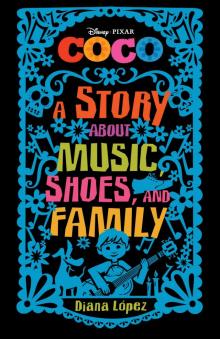 Coco Middle Grade Novel
Coco Middle Grade Novel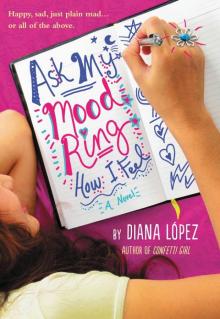 Ask My Mood Ring How I Feel
Ask My Mood Ring How I Feel Choke
Choke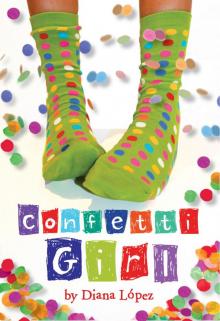 Confetti Girl
Confetti Girl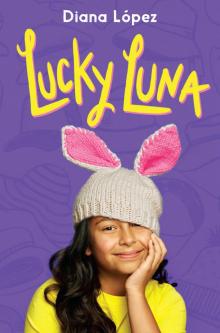 Lucky Luna
Lucky Luna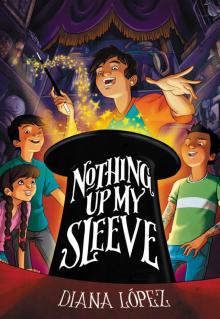 Nothing Up My Sleeve
Nothing Up My Sleeve